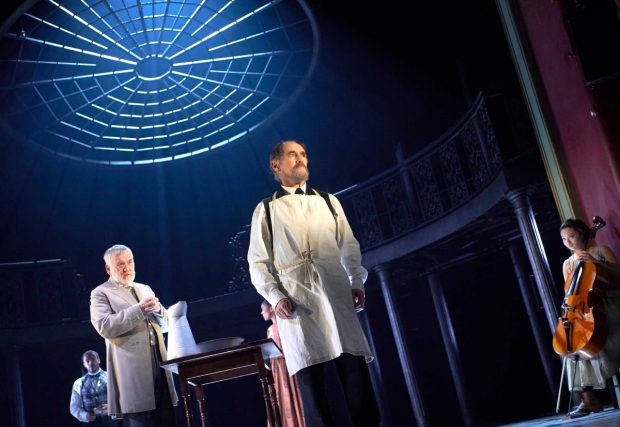Dr Semmelweis review – Mark Rylance hands the disgraced doctor a place in history
The piece marks Rylance’s first time performing at the Bristol venue

© Geraint Lewis
It is no surprise that early on in his career Mark Rylance portrayed Peter Pan for the RSC. When thinking of his great roles over the past fifteen years or so, the sense of the ultimate lost boy isn't far from the surface. When you think of Robert in Boeing Boeing, a deer in the headlights, or Rooster in Jerusalem, calling for the Gods, even Cromwell from Wolf Hall, a man whose background is far from the world he commands, Rylance is a master of the outsider who is not quite of the world he finds himself in.
He adds another outsider now in the form of Ignaz Semmelweis, a pioneering Hungarian physician who in the discovery of the importance of washing your hands, not only seems a pioneer of the COVID age but also took childbirth from a horrific 9 per cent mortality rate down to under 1 per cent during his experimentation. Ignored by a profession who did not want to countenance the fact that it might be their own working practices that were putting their patients at risk, Semmelweis died without his findings being fully put into place. It is said that revolutionary ideas take 40 years to become readily accepted. There was no celebration of his ideas in his lifetime, instead, a breakdown and a stay in an institution brought his time to a shortened end.
This leaves Stephen Brown's slightly overlong play, in collaboration with Rylance, with plenty of action to show, though with a slightly challenging protagonist at his centre. For it was said the man struggled to communicate and Rylance takes this creed to the max. He stumbles across almost every line, as though words can't quite communicate the depths of what he is getting at. His eyes appeal for understanding, even if his communication blocks rather than enlightens. It's a highly skilled piece of work, though one that unfortunately provides resonances of actors not being quite on top of his lines. It's a fascinating paradigm and part of the high-flying balancing act that makes any encounter with Rylance one to saviour. But I'm not sure it fully flies in quite the same way his best work does.
Deciding to make it a time play (most of its action happens in the past) allows its creative team to create a dreamscape of a production. Violinists and dancers patrol the stage and the auditorium, stretching time in the way dreams often can- at 160 minutes it could do with a trim- and lit by Richard Howell with ethereal magic. It often looks beautiful, Antonia Franceschi's choreography, underscored by Adrian Sutton's score for live violins, bleeds into Ti Green's imposing mid-19th-century set, an oculus above appearing to be an ever-present voyeur into the dangers women in childbirth faced.
In a production that you expect will be seen in London once Rylance has got Jerusalem out of the way, there is high-end support. Thalissa Teixeira is a sympathetic presence as Semmelweis' wife trying to make sense of her husband's past, though the play does not have much time for showing him as a loving family man which makes her devotion a bit wearying, while Jackie Clune is particularly powerful as a career Nurse who tragically proves the thesis around washing hands correct. As friends, allies, and enemies Sandy Grierson, Felix Hayes, Enyi Okoronkwo, Daniel York Loh, and Alan Williams provide plenty of variety.
It's a classy production with plenty of artists working at the top of their game and the ideas seem even more resonant in a Covid world. Yet it lacks the frisson you feel when theatre really strikes a light. It drifts like those long nights of winter dreams and so lacks an urgency as a result.












